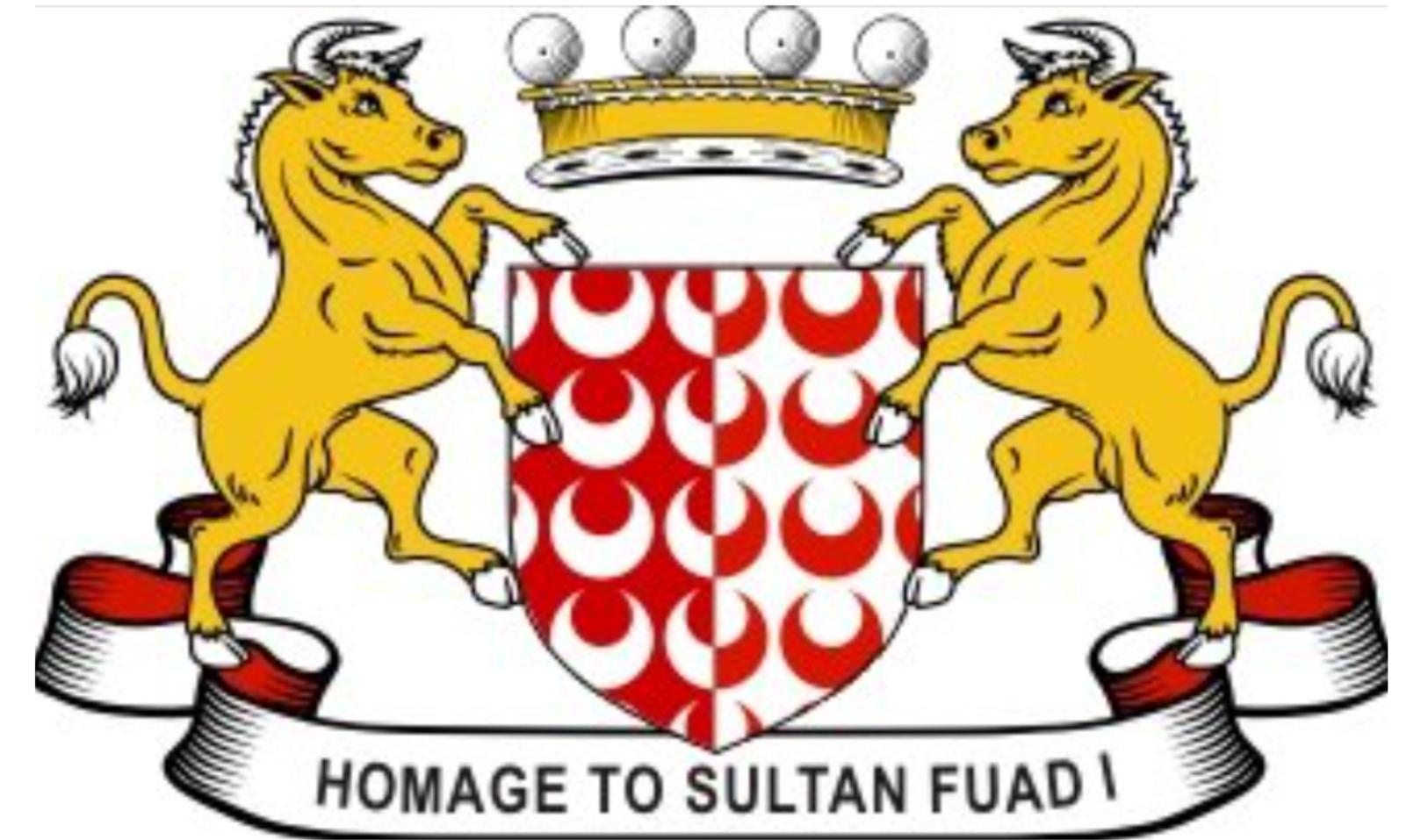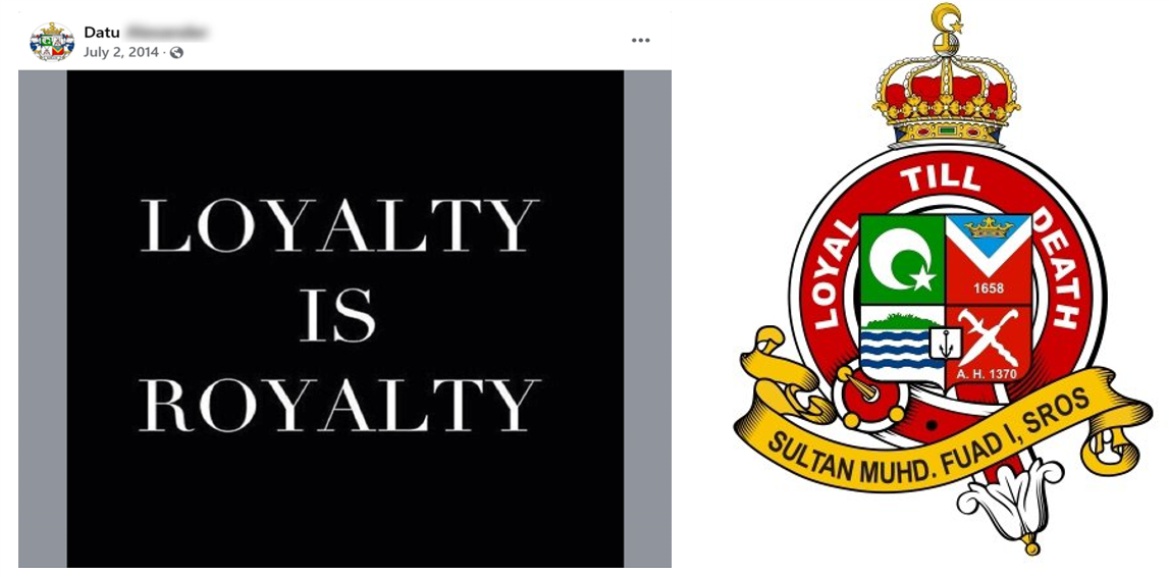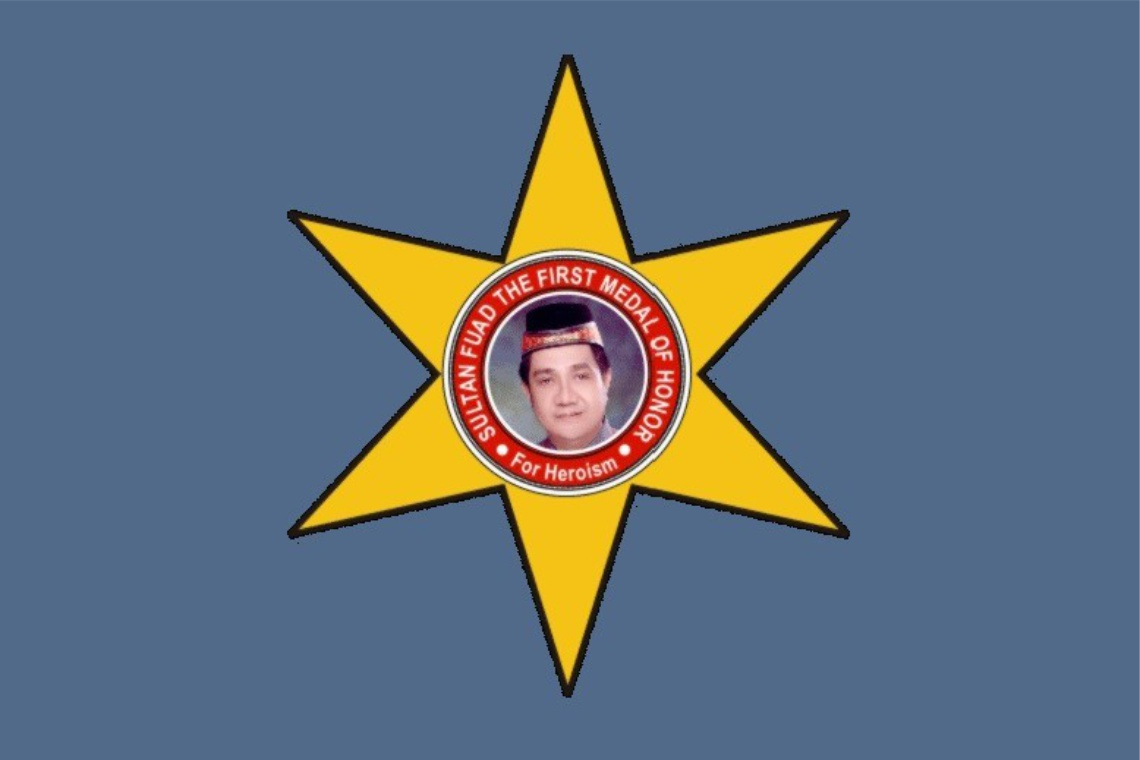The “Medal of Honor” crafted and issued by Fuad Kiram to reinforce symbolic allegiance within his RHSSS network. Image Source: RoyalSulu Website
What began as a bid for power became a blueprint for symbolic fraud with real-world consequences.
Fuad Kiram, a self-proclaimed Sultan who emerged as a rival claimant to the throne of Sulu, borrowed centuries of symbolic tradition for his fabricated monarchy: the Royal Hashemite Sultanate of Sulu and Sabah. Yet the entity he constructed diverged sharply from the genuine heritage of the historical Sultanate of Sulu—an institution grounded in Tausug tradition and history. His claim ultimately played a central role in a multibillion-dollar arbitration case against Malaysia, underscoring how symbolic authority can be leveraged for geopolitical and financial gain. As KnowSulu previously exposed in FRAUD Kiram: The Royal Ruse of Professional Conmen Fuad and Omar Kiram, Kiram’s version of kingship relied heavily on performance, persuasion, and symbolic manipulation. This follow-up investigation delves deeper into one of the most far-reaching aspects of his deception: a global network of honorary titles used not for ceremonial heritage, but for political loyalty, influence peddling, and international affinity fraud.
Constructing a Kingdom
Fuad Kiram laid the foundations of a manufactured monarchy through a calculated series of moves that mimicked the trappings of royal institutions. His scheme built a system of symbolic manipulation that drew fringe actors worldwide into a collective illusion of nobility.
At the center of this fiction stood the Royal Hashemite Sultanate of Sulu and Sabah (RHSSS), an entity Kiram invented to present himself as the modern extension of Sulu’s royal lineage. While the historical Sultanate of Sulu—rooted in Tausug tradition—remains a respected cultural institution, it never employed the term ‘Hashemite.’
Kiram attempted to recast the sultanate’s founding lineage by claiming that Sharif ul-Hashim, the 15th-century Arab missionary who founded Sulu’s Sultanate, belonged to the Hashemite line. On the RHSSS website, Kiram asserted: “Both Jordan and [the] Sultanate of Sulu are Hashemite.” Sharif ul-Hashim is widely acknowledged as a Sayyid, but there is no historical evidence linking him to the Jordanian Hashemites. Kiram’s use of the Hashemite label was a strategic rebrand—designed to tap into pan-Islamic prestige and distinguish his fictitious monarchy from rival Sulu claimants. It was also a loyalty test: those who adopted the label signaled their allegiance to Kiram’s version of the royal narrative.
Kiram’s use of the Hashemite label was a strategic rebrand—designed to tap into pan-Islamic prestige and distinguish his fictitious monarchy from rival Sulu claimants.
The phrase “and Sabah”—appended to the name of his invented entity—was itself a deliberate addition. By inserting this into the RHSSS name, Kiram sought to assert ownership over Sabah and reinforce the idea that he held sovereign rights to the territory. In this way, the RHSSS did not just represent symbolic authority—it served as intelligent propaganda. Any titleholder who endorsed the RHSSS name, knowingly or not, was effectively endorsing Kiram’s geopolitical claim to Sabah.
Any titleholder who endorsed the RHSSS name, knowingly or not, was effectively endorsing Kiram’s geopolitical claim to Sabah.
To amplify royal authority, Kiram began conferring hollow titles such as Baron, Baronet, and Knight—terms borrowed from European nobility that had no connection to Tausug tradition. At first, these titles served to recruit regional and international support in his bid to dethrone his nephew Muedzul and position himself as Sultan. Over time, the strategy evolved: the titles became instruments for securing broader loyalty—not only to bolster his claims over Sulu and Sabah, but also to attract legal, financial, and media services from individuals eager to trade favors for symbolic recognition.
Among the first individuals enlisted into this sprawling ecosystem was a Mindanao journalist who Kiram ceremonially dubbed “Royal Information Minister.” Embracing the role, the journalist published articles that advanced Kiram’s contested claim to the throne—explicitly referring to him as the reigning Sultan, despite widespread skepticism. The journalist’s loyalty was swiftly rewarded. The RHSSS granted him an ornate coat of arms to honor his “Homage to Sultan Fuad I,” marking one of the first visible exchanges in Kiram’s larger scheme of symbolic influence: conferring fake honors to buy public allegiance and control the narrative.
✉ Get the latest from KnowSulu
Updated headlines for free, straight to your inbox—no noise, just facts.
We collect your email only to send you updates. No third-party access. Ever. Your privacy matters. Read our Privacy Policy for full details.

Award issued by RHSSS to a Mindanao journalist who legitimized Fuad Kiram’s royal claim in print. Image Source: Facebook - RHSSS
Through a self-crafted Royal College of Arms, Kiram issued ornate coats of arms and posted elaborate declarations—often requiring recipients to publicly showcase their bestowed identities on social media platforms, a prerequisite that further entrenched Kiram’s visibility, propaganda, and network reach. This expanded into a system of reputational laundering and affinity scams. Various recipients had militant or criminal backgrounds, fringe affiliations, or were involved in dubious enterprises. Their unearned prestige enhanced Kiram’s imaginary court, while his awards gave them a veneer of borrowed status.
Loyalty is Royalty
Titles were, in Kiram’s own words, “free of charge” to any “well-deserving persons [who] adhere[d] to the policies of HM Sultan Fuad A. Kiram I.” In practice, this meant recognizing Fuad Kiram as Sultan and supporting his ambitions—particularly his contested claim over Sabah. RHSSS-affiliated platforms consistently denied any financial transaction, but this was likely an effort to reduce backlash. As KnowSulu previously reported, Kiram’s ex-wife disclosed that titles typically cost between $40 and $100, with higher fees for more coveted honors. Still, the real price was often allegiance and services rendered to Kiram’s RHSSS apparatus.
One titleholder, publicly honored as “Prince,” declared on RHSSS-linked platforms: “LOYALTY IS ROYALTY.” This slogan reflected the system’s foundational logic: unwavering devotion earned elite distinction. Coats of arms bearing the motto “Loyal til death” circulated widely, and “official” RHSSS social media echoed the sentiment: “We thank you esteemed friends for your appreciation and please take note of the Motto of the Tausug warriors ‘LOYAL TILL DEATH’ to our beloved Sultan.” These expressions reinforced a cult of personality around Kiram—where emotional loyalty and public display of titles became both the entry fee and status symbol for membership.
 Mottos such as “Loyalty is Royalty” and “Loyal Till Death” were used to reward compliance and silence dissent. Image Sources: Left - Facebook page of appointed Datu; Right - RoyalSulu website
Mottos such as “Loyalty is Royalty” and “Loyal Till Death” were used to reward compliance and silence dissent. Image Sources: Left - Facebook page of appointed Datu; Right - RoyalSulu website
A Court of Conmen
The RHSSS royal network also extended into religious legitimacy. According to Kiram’s RoyalSulu website, “The Hon. Sharif Datuk Zain Jali, DRK, DROS,” a known Islamic jurist, was appointed to head both the Darul Ifta (House of Jurists) and Darul Awqaf (House of Treasury, Endowment & Charity) for the “Royal Hashemite.” His stated responsibilities included securing donor funds to “support the needs of the widows, orphans and the underprivileged people of the Sultanate.”
But Zain Jali’s record told a darker story. Publicly identified as a spiritual leader within the Moro National Liberation Front (MNLF)—a separatist group long linked to militant operations in the southern Philippines—Jali had a history that undercut any appearance of moral authority. In a 1992 interview with UCA News, he openly admitted that MNLF operatives had kidnapped “Chinese and Japanese traders” for ransom, saying of missionaries, “We don’t benefit by kidnapping them… they don’t have money.”
“We don’t benefit by kidnapping them… they don’t have money.”
Kiram’s decision to appoint Jali—who had openly admitted to profiting from ransom kidnappings—as the treasurer of his kingdom was not just reckless, it was incendiary. But it was also revealing. Kiram wasn’t merely interested in religious legitimacy; he was exploiting Jali’s militant credentials, his wide influence within the MNLF, and his access to fast, illicit capital. This move laid bare how Kiram’s kingdom functioned not on credibility or tradition, but on opportunism. Kiram's monarchy functioned through symbolic appointments of controversial figures whose practical value lay not in moral standing, but in operational utility.
Kiram’s monarchy functioned through symbolic appointments of controversial figures whose practical value lay not in moral standing, but in operational utility.
To reinforce the illusion of statesmanship and global recognition, Kiram embellished his personal biography. His official RHSSS resume falsely claimed he held an Honorary Doctorate in “Diplomacy and Peace Building” for his “to resolve Sabah issues through peaceful means” from the “Academy of Chartered Diplomacy Europe, London”—an institution that does not exist. In reality, the only traceable honorary doctorates awarded to both him and his son, Al-Mezzheer, came from the International Royal Academy UN (IRAUN), and were in the field of philosophy.
Unsurprisingly, IRAUN is not a recognized academic institution but a vanity outfit run by those who claim descent from the last Czar of Russia. Though it lists New York City as its headquarters, clicking “get more information” on its website redirects users to a hollow medical consultation service listing contact numbers from Bangladesh—an immediate red flag for any institution claiming international credibility. IRAUN bolsters its image with ceremonial trappings like an anthem, flag, and gold pins, but lacks academic standing. Kiram used this sham credential to portray himself as a dignitary—claiming diplomatic honors he never earned, while in fact actively eroding diplomatic credibility between the Philippines and Malaysia.
These honors were not anomalies but part of a wider pattern of credential fraud, where invented institutions mutually reinforced each other's pretense of authority. Vincenzo Cortese, an Italian national deeply embedded in Kiram’s early operations, exemplifies this pattern. Cortese was not merely a title recipient—he was a fraudster in his own right, rewarded with multiple accolades by Kiram, including Datuk, Knight, and Representative to Italy & Africa. He runs The Norman Academy, an entity strikingly similar to IRAUN and RHSSS in both structure and purpose. Like these other groups, The Norman Academy offers honorary degrees often tied to fee-based ceremonial events. In fact, one award Kiram gave Cortese was explicitly “for their noble efforts to better the lives of peoples in Europe and Africa”—a claim that stands in ironic contrast to Cortese’s pattern of predatory deception. Cortese, like Kiram, used pomp and pageantry to project prestige without institutional legitimacy. Though he claims his academy is recognized in The Gambia and Florida, records show it is only registered as a business in Florida, not as an academic institution. Their relationship was symbiotic: Kiram granted Cortese hollow titles that affirmed his false authority, and Cortese returned the favor by amplifying the illusion of royal diplomacy.
“Beware of Fake Sultans” and Other Copycats
Eventually, even Kiram’s own warnings became ironic. After receiving multiple titles from Kiram, Cortese later accepted recognition from the so-called Royal House of Maharaja Adinda Aranan—a copycat outfit that Kiram himself had denounced in a public statement titled “Beware of Fake Sultans.” Cortese’s pivot from Kiram to this rival house reveals the fluid opportunism at the heart of the ecosystem—where affiliation and self-worth are inflated through whatever fabricated honors are available.

Italian title recipient Vincenzo Cortese receives another ceremonial medal, expanding his involvement in counterfeit networks. Image Source: Facebook. (2015, March 29). Vincenzo Cortese Medal Post.
Catello Marra, who declared himself the “Governor of Malta”—a title obsolete since Malta’s independence—also served as ‘Lieutenant Grandmaster’ in a dubious Order of Knights echoing Kiram’s ceremonial title-giving. Moreover, he claimed to act as a diplomatic counsellor to the Democratic Republic of Congo’s embassy in Rome and headed the so-called ‘International Organization for Diplomatic Relations,’ which Italian magazine L’Espresso exposed as a “phantom organization.” When L’Espresso published this exposé, Marra retaliated with a €100,000 legal threat, successfully silencing media scrutiny and allowing the scheme to persist unchecked. By March 2025, a new titleholder from India proudly announced receiving the title of “Correspondent Diplomat of Malta in India” from Marra at the Correspondents Diplomatiques Annual Nominations Event—an uncanny echo of The Norman Academy’s elaborate ceremonies.
Marra, like Cortese, mimicked the ceremonial trappings of legitimate institutions: sashes, seals, and signature lines overflowing with honorifics. Their ventures, inspired by Kiram’s example, followed his guiding principle: that only “deserving” individuals—those he knew personally and who demonstrated allegiance, utility, or compliance—would receive titles. These were calculated recognitions, not random gestures, meant to reward behavior that propped up Kiram’s manufactured monarchy.
The Hidden Cost
For the Tausug people, the costs are harder to quantify but deeply felt. Kiram’s behavior undermined genuine cultural and historical institutions in Sulu, dragging the region’s heritage into scandal. His so-called kingdom was never grounded in governance—he made no attempt to lead by example. Instead, the example he did set—imitated by copycat royals and conmen—was one of opportunism, manipulation, and image-driven deceit. His monarchy existed not to serve, but to stage: constructed on paper, cloaked in ceremony, and engineered for personal gain. Through his RHSSS title-for-loyalty scheme, Kiram spawned an international web of fantasists, opportunists, and image-builders. Each calculated appointment reinforced the illusion. Though entirely fictitious, his ‘Royal Hashemite’ monarchy had real consequences: it opened doors, enabled fraud, and handed conmen a scepter disguised as royal legitimacy. This was the legacy he chose to leave behind.
With the arbitration appeal pending, Kiram’s legacy demands examination—not as a sidelined monarch or sympathetic claimant, but as the architect of a transnational blueprint for symbolic fraud.
REFERENCES
Caruana Galizia, D. (2016, December 17). Wife and brother of Rome official arrested in anti-Mafia investigation live in Malta. https://daphnecaruanagalizia.com/
International Consortium of Investigative Journalists. (n.d.). Catello Marra. Offshore Leaks Database. https://offshoreleaks.icij.org/
International Royal Academy UN. (n.d.). Contact Us page. https://mediclinic.qodeinteractive.com/
International Royal Academy UN. (n.d.). Emblems of IRAUN. https://www.royalacademyun.org/
International Royal Academy UN. (n.d.). Honoree Doctors: Fuad Kiram and Al-Mezzheer Kiram. https://www.royalacademyun.org/
KnowSulu. (2025). FRAUD Kiram: Royal Ruse of Professional Conmen. KnowSulu Investigative Archive. https://knowsulu.ph/
RoyalSulu. (2013). Beware of Fake Sultans. https://web.archive.org/
RoyalSulu. (2013). Biography of Fuad Kiram. https://web.archive.org/
RoyalSulu. (n.d.). Orders and decorations of the Sultanate of Sulu. https://web.archive.org/
UCA News. (1992, March 31). No Muslim rebel involvement in kidnapping, spiritual leader says. https://www.ucanews.com/



